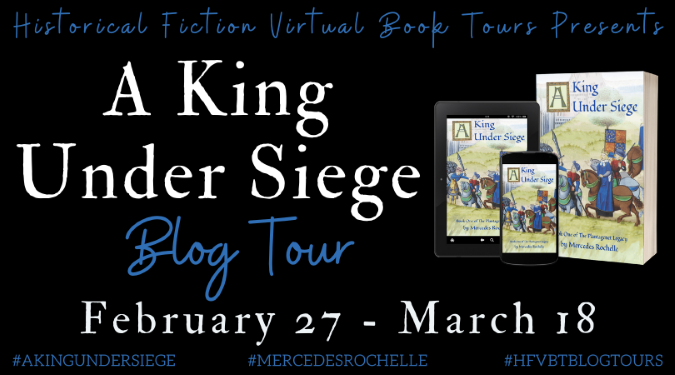A King Under Siege Book Tour
A King Under Siege by Mercedes Rochelle
Publication Date: January 5, 2019
Sergeant Press
eBook & Paperback; 310 Pages
Series: The Plantagenet Legacy, Book One
Genre: Historical Fiction/Biographical
"This story is rich in historical detail. It has so obviously been meticulously researched. I cannot but commend Rochelle for this exceptional work of scholarship. A King Under Siege: Book One of The Plantagenet Legacy is one of those books that once started is impossible to put down. This book is filled with non-stop action. There are enough plots and conspiracies to satisfy any lover of historical fiction. This is storytelling at its very best." Mary Anne Yarde from Myths, Legends, Books & Coffee Pots Blog
Available on Amazon
Excerpt:
Ten thousand or more crowded the banks of the Thames near the King's manor of Rotherhithe, shrieking and howling like the demons of hell. The royal barge, hung with the Plantagenet lions, floated safely in the middle of the river, while King Richard gripped his sword, trying to emulate his royal forefathers. His elders would agree that the fourteen year-old monarch looked every bit the Plantagenet successor; he was tall for his age, with delicate features and red hair like his father. Richard was born to be king and now he must prove it—though at the moment he felt more like a lamb than a lion.
He waited for the frenzy to exhaust itself. "Why are you here and what do you want?" The young voice, clear and shrill, reached its listeners who broke out once again into a clamor, shaking their farm tools and rusty old blades. "Come to the shore!" One voice carried over the din. "Speak with us in person!"
Standing under a large red canopy with his counsellors, Richard glanced upriver at the four smaller barges serving as his escort. The boats had hung back, not daring to come any closer. This was a sorry plight his advisors had led them into! Sighing, Richard turned to Archbishop Sudbury; he could see the terror in the prelate's face. This wasn't helping.
"I p-promised I would speak with them," the King said uncertainly. "I must at least try."
Bristling under two great banners with St. George's cross and forty pennons, the mob continued its uproar while the King turned to his other advisors. Sir Robert Hales, England's treasurer, stepped up beside the archbishop. "We can't expect any mercy from them. They are out for blood." Richard frowned, dissatisfied. Hales might be Lord Grand Prior of the Knights Hospitaller, but today his courage seemed to have fled. The man's eyes were almost bulging from his head.
Richard then turned to the Earl of Salisbury, the most experienced soldier on the barge. "And what is your advice?" he asked, trying to keep a brave face.
"You cannot go ashore. They might restrain you—hold you hostage, or worse. This is an undisciplined rabble."
This was the best counsel they could give him? He had to do something, though his advisors would probably criticize him for making the wrong choice— with the utmost courtesy, of course, and polite language. Taking a deep breath, Richard turned back to the crowd. He hoped he could control his stutter. "What is it you want from me?" he shouted. "Tell me, now that I have come this far."
He stood, arms crossed, while the men closest to the river conferred with each other. Finally, coming to a decision, the apparent leader got into a boat with a couple of rowers. They brought their craft as close as they dared. "Here is what we want," the man called. "We demand the heads of John of Gaunt, Archbishop Sudbury, Treasurer Hales, Chief Justice Robert Belknap, Robert Plesington Baron of the Exchequer, John Legge and Thomas Brampton."
"Why, you seek to deprive me of my chief ministers," Richard cried. Behind him, he could hear Sudbury calling down God's curses on their heads.
"We seek to save you from corrupt officials," the rebel shouted back.
"By killing them all? How would that help me?"
"They are destroying the country with their dishonest administration."
"This is too dangerous," Salisbury spoke in Richard's ear. "We must leave."
Nodding in agreement, the King tried one last time. "If you wish to continue negotiations," he called, less sure of himself, "you may do so at Windsor on Monday next." While he was speaking, the barge was already turning around. Stunned at losing their advantage, the crowd howled in anger and the rebel boat fell back in confusion. But Richard no longer cared. He was headed for the safety of the Tower, though for the first few minutes they were at the mercy of any archer who might choose to draw his bow. Fortunately, nothing happened aside from the shouts of "Treason! Treason!" that diminished as they gained speed.
The King stared at the receding mob, biting his lip, until they were out of range. He had never felt so alone. This debacle was not of his making, yet everyone was looking to him for a solution. It just wasn't fair. Even though he had been king for four years, he was in leading reins just as assuredly as any young horse. He sat in council meetings—even presided at Parliament—but his opinions were politely dismissed. They said he was too young, too inexperienced to make decisions. He was expected to watch and learn while his chief ministers made a mess of things. Well, they certainly taught him what not to do! And now, with half the country in an uproar, all they could do was dither. No one had taken the rising seriously enough to gather a force to confront the rebels, and now that the angry multitude was at the gates of London, no one had a suggestion what to do about it. Obviously, this attempt had failed disastrously. But at least he had tried.
He waited for the frenzy to exhaust itself. "Why are you here and what do you want?" The young voice, clear and shrill, reached its listeners who broke out once again into a clamor, shaking their farm tools and rusty old blades. "Come to the shore!" One voice carried over the din. "Speak with us in person!"
Standing under a large red canopy with his counsellors, Richard glanced upriver at the four smaller barges serving as his escort. The boats had hung back, not daring to come any closer. This was a sorry plight his advisors had led them into! Sighing, Richard turned to Archbishop Sudbury; he could see the terror in the prelate's face. This wasn't helping.
"I p-promised I would speak with them," the King said uncertainly. "I must at least try."
Bristling under two great banners with St. George's cross and forty pennons, the mob continued its uproar while the King turned to his other advisors. Sir Robert Hales, England's treasurer, stepped up beside the archbishop. "We can't expect any mercy from them. They are out for blood." Richard frowned, dissatisfied. Hales might be Lord Grand Prior of the Knights Hospitaller, but today his courage seemed to have fled. The man's eyes were almost bulging from his head.
Richard then turned to the Earl of Salisbury, the most experienced soldier on the barge. "And what is your advice?" he asked, trying to keep a brave face.
"You cannot go ashore. They might restrain you—hold you hostage, or worse. This is an undisciplined rabble."
This was the best counsel they could give him? He had to do something, though his advisors would probably criticize him for making the wrong choice— with the utmost courtesy, of course, and polite language. Taking a deep breath, Richard turned back to the crowd. He hoped he could control his stutter. "What is it you want from me?" he shouted. "Tell me, now that I have come this far."
He stood, arms crossed, while the men closest to the river conferred with each other. Finally, coming to a decision, the apparent leader got into a boat with a couple of rowers. They brought their craft as close as they dared. "Here is what we want," the man called. "We demand the heads of John of Gaunt, Archbishop Sudbury, Treasurer Hales, Chief Justice Robert Belknap, Robert Plesington Baron of the Exchequer, John Legge and Thomas Brampton."
"Why, you seek to deprive me of my chief ministers," Richard cried. Behind him, he could hear Sudbury calling down God's curses on their heads.
"We seek to save you from corrupt officials," the rebel shouted back.
"By killing them all? How would that help me?"
"They are destroying the country with their dishonest administration."
"This is too dangerous," Salisbury spoke in Richard's ear. "We must leave."
Nodding in agreement, the King tried one last time. "If you wish to continue negotiations," he called, less sure of himself, "you may do so at Windsor on Monday next." While he was speaking, the barge was already turning around. Stunned at losing their advantage, the crowd howled in anger and the rebel boat fell back in confusion. But Richard no longer cared. He was headed for the safety of the Tower, though for the first few minutes they were at the mercy of any archer who might choose to draw his bow. Fortunately, nothing happened aside from the shouts of "Treason! Treason!" that diminished as they gained speed.
The King stared at the receding mob, biting his lip, until they were out of range. He had never felt so alone. This debacle was not of his making, yet everyone was looking to him for a solution. It just wasn't fair. Even though he had been king for four years, he was in leading reins just as assuredly as any young horse. He sat in council meetings—even presided at Parliament—but his opinions were politely dismissed. They said he was too young, too inexperienced to make decisions. He was expected to watch and learn while his chief ministers made a mess of things. Well, they certainly taught him what not to do! And now, with half the country in an uproar, all they could do was dither. No one had taken the rising seriously enough to gather a force to confront the rebels, and now that the angry multitude was at the gates of London, no one had a suggestion what to do about it. Obviously, this attempt had failed disastrously. But at least he had tried.
About the Author
Website | Facebook | Twitter | Goodreads
Blog Tour Schedule
Thursday, February 27 Review at A Darn Good Read Saturday, February 29 Excerpt at Books, Dreams, Life Excerpt at Passages to the Past Monday, March 2 Review at A Chick Who Reads Wednesday, March 4 Review at Gwendalyn's Books Friday, March 6 Review at Books and Zebras Tuesday, March 10 Review at Nurse Bookie Thursday, March 12 Feature at I'm All About Books Friday, March 13 Review at bookramblings Review at Impressions In Ink Monday, March 16 Review at Broken Teepee Wednesday, March 18 Interview at Passages to the PastGiveaway
During the Blog Tour, we are giving away 5 paperback copies of A King Under Siege! To enter, please use the Gleam form below. Giveaway Rules – Giveaway ends at 11:59 pm EST on March 18th. You must be 18 or older to enter. – Paperback giveaway is open to the US only. – Only one entry per household. – All giveaway entrants agree to be honest and not cheat the systems; any suspicion of fraud will be decided upon by blog/site owner and the sponsor, and entrants may be disqualified at our discretion. – The winner has 48 hours to claim prize or a new winner is chosen. A King Under Siege


Comments
Post a Comment